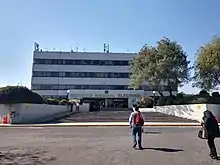Instituto Nacional Electoral
The Instituto Nacional Electoral (INE) (English for National Electoral Institute) (formerly Federal Electoral Institute (Instituto Federal Electoral, IFE)) is an autonomous, public organization responsible for organizing federal elections in Mexico, that is, those related to the election of the President of the United Mexican States, the members of the Lower and Upper chambers that constitute the Congress of the Union as well as elections of authorities and representatives at local and state levels. The organization's president is Lorenzo Córdova Vianello, appointed in 2014 for a 9-year tenure.
 | |
| Abbreviation | INE |
|---|---|
| Formation | 1990 (as Instituto Federal Electoral) 2014 (as Instituto Nacional Electoral) |
| Type | Non-governmental organization |
| Purpose | Government elections |
| Headquarters | Av. Viaducto Tlalpan 100, Tlalpan, Mexico City |
Official language | Spanish |
Director | Lorenzo Córdova Vianello |
| Website | www.ine.mx/ |
Formerly called | Federal Electoral Institute (Instituto Federal Electoral, IFE) |
 |
|---|
| This article is part of a series on the politics and government of Mexico |
|
|

History
1990–2014

The IFE was formally established on October 11, 1990, as a result of a series of constitutional reforms approved in 1989 and the Federal Code of Electoral Institutions and Procedures (Cofipe), a law passed in August 1990 and currently in force. The legislative branch of the federal government, the national political parties, and the general citizenry participate in its composition.
Since its creation, the constitutional and legal regulations in this subject matter have experienced further major reforms, which have affected the composition and details of the IFE. The most recent of these reforms, approved in 1996, reinforced the level of independence and autonomy of the IFE by completely dissociating the executive branch from any aspect regarding its membership or functions, and by reserving the vote within all its directive bodies to the councilors, the members that do not have links to any party or to any state power or body.
IFE had legal personnel and assets of its own. Its headquarters were located in the Federal District, and it was organized under a decentralized framework that allowed it to exercise its duties throughout the country.
As a result of electoral reforms initiated by President Enrique Peña Nieto, the IFE was dissolved on April 4, 2014, and was supplanted by the National Electoral Institute (Spanish: Instituto Nacional Electoral, INE).
2014-present
With its creation in 2014, the National Electoral Institute took over all responsibilities of the Federal Electoral Institute and was furthermore charged with oversight of all elections at local and state level, as well as plebiscites and the regulation of processes of citizen´s participation in public administration.[1] Lorenzo Córdova was appointed chairman of the General Council for a 9-year period starting 2014.
Political parties and associations
IFE was charged with the registration, funding and oversight of national political parties. Starting 2014, INE was also charged with oversight over local political parties, which before 2014 were registered by each state's Electoral Institute. Rules and guidelines for the registration of political parties are outlined in the Federal Code of Electoral Institutions and Procedures.
In addition, INE registers national political associations, which are intended to assist in the development of democratic life and the country's political culture, as well as being intended to create a better informed public opinion. The creation of a national political association is usually regarded as the first step towards the creation of a full-fledged political party.
Professional Electoral Service
In order to guarantee a professional and specialized performance of its responsibilities, the IFE used a special system of recruitment, selection, training, and evaluation of qualified staff to provide electoral services, especially in its fundamental areas, which are the ones directly linked with the preparation and organization of elections.
Results
The first electoral process organised by INE was in the period 2014-2015. In total 2,159 office holders were appointed after winning elections at local, state and national levels. The increase in violence against women participating in electoral processes prompted the institution to prepare and adopt, together with other organizations, a protocol to eliminate violence against women in electoral processes.[2]
The 2018 Mexican general election were coined by INE as the biggest electoral process in Mexican history. Over 3,000 positions were to be filled by popular vote. The election results proved to be unprecedented in its scope and impact on Mexico´s political landscape. [3] Despite severe challenges, such as no less than 145 election-related deaths, the 2018 elections were generally considered free and fair.[4]
References
- "Sobre el INE". Instituto Nacional Electoral (in Spanish). Retrieved 2021-01-01.
- admin2 (2016-05-20). "New Protocol Presented in Mexico to Deal with Cases of Political Violence Against Women". International Knowledge Network of Women in Politics. Retrieved 2021-01-01.
- "Mexico 2018 Election Overview". www.bakerinstitute.org. 2018-08-01. Retrieved 2021-01-01.
- "Mexico". Freedom House. Retrieved 2021-01-02.